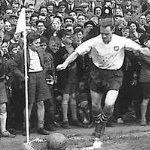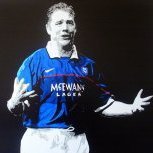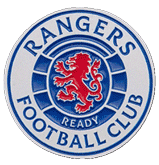Leaderboard
Popular Content
Showing content with the highest reputation on 10/08/21 in Posts
-
How's Josh getting on these days? ?4 points
-
I don’t have to imagine. I’m still wild Billy Stevenson was let go.4 points
-
The problem with disappointments like this is there’s no escape from it. You’re trapped by your allegiance. All you can do is suffer and hope there’s some relief around the corner. I’m just hoping Gerrard sees the problem because if he doesn’t then things are only going to get worse.3 points
-
Baffled by the decision to drop Helander for Balogun. Absolutely schoolboy defending from Balogun has cost us tonight and Gerrard has to take the blame for dropping our best man marker. There were loads of other failures out there tonight but those goals were sucker punches and should never have happened. This is now a very worrying start to the season and those who have brushed off the red flags to date will have woken up now. Hard work ahead and big decisions to be made in the transfer market.3 points
-
Like watching 2 different teams. Funnily enough I think we would have done better if they had had eleven men on whole game.3 points
-
3 points
-
We were forced into wearing the new strip by UEFA apparently. I'd rather see us in the home shirt but again, the choice of strip should not matter. It's all about attitude and quality.3 points
-
Candieas was a fantastic player for us , and still would have been , I wish he was still here .3 points
-
3 points
-
I find it childish to criticise Charles Green for suing for wrongful arrest and prosecution, which have nothing to do with anything he did in his official capacity at Rangers.3 points
-
I'm glad my opinion differs from yours.3 points
-
I agree and that's why I never feel comfortable when we sit on a 1-0 lead against lesser opposition (that's just a general moan).3 points
-
I’m not even going to post a picture of this monstrosity , and supposedly we are wearing it tonight , I don’t usually get too bothered by strips , I generally am supportive of all our strips , but who ever ok,d this should be sacked , what the board were thinking . 3 months later and it will be the best selling 3rd strip of all time and I will look like a tool ............again .2 points
-
Malmö and Ludogorets and we’d have made the CL group stage. It’s a massive failure and a painful one.2 points
-
Too many players not doing it at the moment. I hate to single players out but what's happened to Barasic. Looks very unsure at the moment. And please can we get beyond lobbing endless crosses into a packed box? That's 3 games in a row we've persisted with this tactic. Ok we scored from a cross tonight but 1 goal out of about 50 crosses over 3 games is not a good hit rate.2 points
-
We simply need to put this behind us and focus on getting into the europa league and domestically too wee lesson tonight on the benefits of playing 2 strikers2 points
-
You can argue all you want about team selection but tonight we put in a great 1st half overall, the whole team shat it 2nd half2 points
-
Genuinely at a loss to explain how we've managed to switch off four times across that tie to ship goals we never normally look like losing. At half-time in both games we're odds-on favourites but, for reasons only the manager can explain, we did not turn up early in those halves. As said before the match, there's no excuses not to go through here. Malmo are clearly no mugs but we've only ourselves to blame for making such a poor start to this season. We are blunt, unreactive and lacking any sort of spark whatsoever. Where are our big players?2 points
-
They are glory hunters, not fans. They want to be there for all the celebrations but don't want the rest of the baggage that goes with supporting a team.2 points
-
All that hard work last season, and we go out with a whimper at the first hurdle.2 points
-
They are quite right! managing the game I would wanted us to do.2 points
-
Tbh we’ve gone backwards so much we’re nothing like a CL team now. Following a football team can be a very frustrating occupation.2 points
-
2 points
-
2 points
-
11 goals and 15 assists in 70 games for candeias. certainly decent when added to his work rate.2 points
-
You're wrong, but is that not enough?2 points
-
That's fine. But only one of us is right...2 points
-
Stick a pin in it, apart from Robertson you're bound to pick a winner.2 points
-
Biggest mistake we ever made was not giving Baxter a wage that complimented his skills .2 points
-
Candeias was sh*te. We don't even play with a RM anymore. Move on. Imagine being hung up on a player that left years ago... ?2 points
-
makes me sick seeing him profit from what he did to us.2 points
-
The weasel that spent a dozen years at ra Piggery rejoicing in the nickname, 'Provo' has had a column in the News of the World/Sunday Sun these last fifteen years. Davy Provan remains relevant because he is a regular golfing partner of Dermot Desmond. His Sky gig has seen him consigned to the English Premiership these last several years, Andy Walker took over his Sky Scottish football beat. He says very little on Sky, keeps his informed gossip for his Sunday column. Yesterday, he penned on the SPFL-Rangers dispute over Cinch sponsorship. He is in doubt the war of words is a continuation of last year's SPFL calling the Leagues early and, relegating both Hearts and Thistle. Rangers led the charge then against Doncaster, MacLennan and, McKenzie; claiming they were unfit for purpose. Doncaster's role in particular angered more than just Rangers. The Dundee lost e-mail vote, Doncaster's constant lobbying/bullying Club Chairs and, MacLennan's briefing of the likes of Motherwell's Andrew Wilson to ensure belittling of Rangers claims post vote. Informed Provo is sure Rangers have got their man ie Doncaster over the Cinch deal. The deal will collapse because of Doncaster's cavalier approach and SPFL Chairs will be unforgiving because the expected revenue will not materialise. Of course, if Doncaster is toast, then both MacLennan and McKenzie will be anxiously reassessing their pension plans. For once, I hope Provan's information is spot on?2 points
-
And Rangers enjoyed a share of luck which they hadn’t had for a number of seasons.2 points
-
1 point
-
Nothing else for it!. We need to start winning matches and quickly!1 point
-
I never dreamed it would be our defending that would let us down1 point
-
1 point
-
YES YES YES ? We have been absolutely brilliant. Well deserved!1 point
-
1 point
-
Would have sakala on for kent. And hagi on for arfield. I think we will have to be very clever with our subs tonight. One of our weaknesses is leaving it to late or not making the right changes.1 point
-
A long read: FOOTBALL | BOOK EXTRACT A crying shame: Lionel Messi’s part in the downfall of Barcelona In 2015 Barcelona won the Champions League. Now they are a footballing basket case. In this book extract Simon Kuper charts an astonishing decline and explains why having the world’s best footballer did nothing to help Messi has enjoyed great success with Barcelona but it has come at a substantial cost Simon Kuper Tuesday August 10 2021, 12.01am, The Times https://www.thetimes.co.uk/article/a-crying-shame-lionel-messis-part-in-the-downfall-of-barcelona-95wkn6l7w Staggering cost of keeping a genius After Lionel Messi renewed his contract with Barça in 2017, the club’s head of legal services, Román Gómez Ponti, sent the CEO, Òscar Grau, an email that consisted of one word: “ALELUYA”, with the final A repeated 69 times. Grau replied: “The extension of Leo Messi . . . was important for the survival of FC Barcelona.” The three separate contracts guaranteed Messi an annual salary of over €100 million [about £84 million], according to a document obtained by Football Leaks and passed to Germany’s Spiegel magazine. One internal club document recommended: “The player needs to be aware of how disproportionately high his salary is relative to the rest of the team.” Indeed, Messi was earning about as much as a typical top-class team of the time. Pretty soon, Barça were paying him even more. Aided by the release clause in Messi’s contract, his father, Jorge, negotiated large annual pay hikes. Over the four years from 2017 to 2021, the player earned more than €555 million in total, according to highlights from his 30-page contract published in El Mundo. A senior Barça official told me that Messi’s salary had tripled between 2014 and 2020. He added: “Messi is not the problem. The problem is the contagion of the rest of the team.” Whenever Messi got a raise, his team-mates asked for one as well. After about 2015, Barça morphed from més que un club (more than a club) into Messi’s club. “Messi-dependencia” is an old concept in Barcelona, but originally it described an incidental phenomenon: Messi winning a tight match. Over time, Messidependencia became the system. Barça parasited off Messi, until he began eating the club. In 2020 sporting disaster, economic disaster and Messi’s decision to leave all struck at once. How Barcelona and Messi stopped playing great football During Messi’s first decade in the team, Xavi and Andrés Iniesta had enough status not to give him the ball too early in an attack. But as the duo faded from the team, and Neymar left, Barça’s strategy simplified into Messidependencia. From 2017 until 2019, Messi’s shots and assists accounted for between 45 and 49 per cent of Barcelona’s annual expected goals, calculates the Financial Times data journalist John Burn-Murdoch. Barça’s system became “get to the final third, then give the ball to Messi, wherever he is”. Barcelona’s first team were abandoning Barcelona football. Instead of Messi moving as part of a fluid collective that embodied the principles of Johan Cruyff, Barcelona’s tactical mentor, now his team-mates simply reacted to his moves. Most were awed by him. Frenkie de Jong told me: “Messi’s really much better than the other players. I think people underestimate that. You’re playing with the very best players in the world, but he’s far above that. You have to make sure you’re always trying to keep an eye on him.” Meanwhile, although nobody at Barça wanted to talk about it, the king was growing old. Messi stopped defending. When Barça lost the ball, Messi would often trudge back alone, yards offside behind the opposition’s defenders. As the team aged too, Barça’s training sessions slowed down. This was a shock for Antoine Griezmann, who had come from Atletico Madrid, where “every training session was at the intensity level of a match”. Barcelona’s defenders and midfielders rarely overlapped any more. This went against the grain of modern football. The sport continued to evolve weekly, and the one-time innovators Barça were being overtaken. “Every day football gets more spectacular, the players physically, technically and tactically stronger,” Gerard Piqué remarked. “I always say that the best defenders in history are those of today.” Even Franz Beckenbauer, he added, was “worse on the ball, slower and understood the game less well” than Piqué’s generation. As for defenders who just kicked people, they had died out. Piqué was right that football kept improving — but only outside Barcelona. While Barça neglected pressing, other teams updated it. Gegenpressing, the Germans called the latest version: chasing up the opposition the moment you lose possession, so as to win the ball near their goal, before their defence can organise. It was Ajax’s “hunting” of the 1970s on fast-forward — a game so rapid it should be called “storming”. Storming teams adopted some of Barça’s innovations, such as Pep Guardiola’s five-second pressing rule, but discarded others, like the obsession with possession. By 2020, storming had become the orthodoxy, practised even by traditionally cautious teams such as Juventus and Chelsea. In February 2017 a storming Paris Saint-Germain beat Barcelona 4-0 in the Champions League. Barça won the second leg 6-1 with their famous remontada (comeback), but then lost 3-0 away to Juventus in the quarter-final and were eliminated. In 2018 they lost 3-0 at Roma at the same stage and were eliminated again. The good news was that Cruyffian attacking pressing football still worked. The bad news was that other clubs had modernised it. Yet the club did not hire a coach to turn their ageing players into a high-intensity storming unit. Barça’s thinking was that, with a core of veteran world-class players, topped by Messi, a strong coach would only get in the way. Every Barça coach from 2013 until 2020 understood his own shrunken role. When I visited Ernesto Valverde in 2019 at the first team’s training ground, the Camp Tito Vilanova, his white office walls were almost bare, except for the team’s schedule. There was scarcely a personal touch in the room. Valverde knew he was just a caretaker. On May 1, 2019, at half-time in the home leg of the Champions League semi-final against Liverpool, with Barça leading 1-0, Messi said: “Try to calm the match. I know it’s hard, but try. If we play one against one, they are stronger. We’re not used to it; they’re quick. Then we’re going up and down; it’s a lottery. If we have control, it’s another story.” In a seven-minute spell in the second half that night, Messi sealed a 3-0 win. Afterwards, a smiling Jürgen Klopp bounded into Liverpool’s forlorn changing room shouting: “Boys, boys, boys! We are not the best team in the world. Now you know that. Maybe they are! Who cares? Who cares! We can still beat the best team in the world. Let’s go again.” That night, it sounded like bravado. Barça really did look like the best team in the world. Three days after clinching their second straight Spanish title, they had one foot in the Champions League final, where they would be favoured to beat Ajax or Tottenham Hotspur. There was life in the old dog yet. Six days later, in the second leg at Anfield, Barça returned to their changing room at half-time 1-0 down. Jordi Alba, whose error had given Liverpool the goal, was in tears. The whole team was anxious. Once a group of players has been together for years, every new match becomes an echo of past matches. The thrashings by PSG, Juventus and Roma had given Barça a complex. At this point Messi decided to stand up and remind his team-mates of their deepest fear. “We have to start strong,” he said, his monotone louder than usual. “Remember Roma was our fault. Nobody else’s. We mustn’t let the same thing happen. It was our fault, nobody else’s.” As the Irish journalist Ken Early remarked, Messi seemed to believe that “ ‘Let’s talk about the thing that we desperately don’t want to happen, and get that very firmly in our heads before we go out and play’ is a sound basic format for a captain’s gee-them-up speech.” In the second half Barça crumbled, succumbing 4-0 to Liverpool’s storm. After Anfield, Messi gave his first press conference with Barcelona in four years. “The worst thing,” he said, “and for that we can never forgive ourselves, is that we didn’t fight.” When the team needed a rocket up the arse, as the English phrase goes, he saw it as his job to deliver it. The end is nigh If 1992 had been Barça’s annus mirabilis, 2020 was their annus horribilis. Everyone had seen the cracks in the cathedral’s ceiling. But nobody expected the building to collapse. That year an almost carnivalesque string of mishaps occurred. It started on January 13, when Josep Maria Bartomeu, the club’s president at the time, sacked Valverde after a 3-2 defeat by Atletico Madrid. Though the role of Barça’s head coach had been denuded of most of its responsibilities, one remained: the coach serves as designated scapegoat. He is sacrificed so that the president can live on. The sacking looked harsh. Admittedly Barça hadn’t been playing well, and Valverde had closed the team’s door to gifted players from the Masia, the club’s academy. Still, he had won two Spanish titles in two seasons, and he left with the team top of the league again. The sacking upset Messi: though he does not care much who the coach is, he thought Valverde was a nice guy. The Argentinian was outraged when Barça’s sporting director, Eric Abidal, told a newspaper: “Lots of players were not satisfied [with Valverde] and nor did they work much.” Messi posted Abidal’s interview on Instagram, with a red circle around those words, and wrote that the players had no responsibility for the sacking. Barça offered the coach’s job to Xavi, Ronald Koeman and Mauricio Pochettino. None of the preferred candidates wanted to take over in mid-season. And so the obscure, jobless 61-year-old Cruyffista Quique Setién, who had spent the previous day walking among the cows of his home village in northern Spain, received a surprise call. But in fact, Setién’s unremarkable CV reassured Barcelona. At least a C-list coach would not delude himself that he was the boss of Messi. During half-time at one of his first matches, away to Betis, he asked him what he thought. “What do you think I think?” snapped Messi. He was irritated that the inexperienced Junior Firpo (a protégé of Setién’s in their days at Betis) had started at left back instead of Messi’s friend, the veteran Alba. “This isn’t a youth team!” Messi shouted. “Play your best players.” Soon after half-time, Alba replaced Firpo. On the field Barça were faltering, and at that point the coronavirus came along to shut down football and devastate Spain. In 2018-19 Barcelona claimed revenues of €990 million, but in May 2020, Barça’s vice-president, Jordi Cardoner, told me the pandemic had already wiped about €130 million off the club’s revenues. Spanish football resumed in June. If only it hadn’t. Barça lost the league to Real Madrid, and then, in their Champions League quarter-final in a mercifully empty stadium in Lisbon on August 9, went down 8-2 to Bayern Munich. Six of their starting outfield players that night were aged 31 or over. An era — an unusually long era, by football’s standards — had ended in one night in Lisbon. Now Barça needed to recruit a new team. The problem was that they had run out of money. Setién, whose 15 minutes of coaching fame had at least secured him a nice pension, was dispatched back to his village. Months later, interviewed by Spain’s former manager Vicente del Bosque in El País newspaper, he unburdened himself about Messi. “There’s another facet that’s not that of a player, and that is more difficult to manage,” Setién said. “He is very reserved, but he makes you see the things he wants. He doesn’t speak much. But he watches.” During Setién’s seven months at Barça, he had always been aware that Messi could get him sacked at any moment. He had felt helpless around the player, unable to be himself: “Who am I to change him if they have accepted him for years here and have never asked him to adapt?” Setién diagnosed in Messi a permanent anxiety fuelled by the pressure to win matches. Barça replaced Setién with Koeman, who arranged a meeting at his captain’s house and reportedly told him: “Your privileges in the squad are over, you have to do everything for the team. I’m going to be inflexible.” As so often before in Barcelona’s history, Dutch directness had encountered Latin etiquette. Messi was offended — nobody spoke to him like that — and more so when Koeman then informed Luis Suárez in a one-minute phone call that he was no longer needed. Worse, nobody from the board rang the Uruguayan to thank him for his 198 goals for Barcelona. Messi could accept Barça’s decision to discard his best friend, but he couldn’t forgive the disrespect. It hardly mattered anyway. Messi was planning to leave the club regardless, frustrated that Barcelona were no longer competitive at the highest level. But at the time, Barça held him to his contract and barred him from leaving. In September 2020 I took a train from Paris to Catalonia. I disembarked in a stricken Barcelona. I’d come to meet a director for a post-apocalyptic briefing. He said that the pandemic had slashed revenues by a total of €300 million across two seasons. Barça had offered refunds to its 85,000 season ticket holders (435 of whom had said: “Keep the money.”). The club’s debt was ballooning out of control. The director played down the dreadful figures, but no other big football club had as urgent a need to buy a new team. And no other club in any sport had a higher annual wage bill than Barça’s €500 million, about a quarter of which went to Messi. On top of that sum, noted the director, Barça had to write off another €200 million a year on transfer fees. If a club sign a player for a fee of €100 million and give him a four-year contract, they write off €25 million a season in their accounts. That’s not a problem if he’s a youngster who can be resold later, but Barça’s collection of oldies had little resale value. Adding together the salaries and write-offs, Barça’s total outlay on players was about €700 million a year. Shockingly, that was more than the club’s entire revenue for the 2020-21 season. (Before the pandemic, the club’s target for 2021 had been to surpass €1 billion.) In short, salaries at Barça had got out of hand. Now a period of austerity loomed. La Liga, hoping to prevent bankruptcies during the pandemic, had quietly tightened its spending controls on Spanish clubs. The club were about to pay Suárez millions to leave. It would still end up hundreds of millions over La Liga’s limit, and without money to sign new players. In 30 years of visiting Barcelona, I had never seen the club laid so low. It was now possible to imagine that football’s biggest spenders of the 2014 to 2019 period would eventually have to sell rising stars such as Pedri and Ansu Fati to richer clubs. At the Barça training ground, Koeman’s efforts to change club culture earned him the nickname “Sergeant Koeman”. Players had to report an hour before practice started. Training sessions were extended from one hour to 90 minutes, and became quite strenuous, by Barça’s standards. Koeman said that coaching Barcelona was “the most stressful job” he’d ever had. His wife couldn’t bear to watch their first few matches, and instead went out with De Jong’s girlfriend, who couldn’t watch either. Things on the playing side improved a little after Christmas 2020, with Messi seeming to rediscover his pleasure in football, and combining happily with his young team-mates Pedri, De Jong, Sergiño Dest and a newly professional Ousmane Dembélé. But even with Messi’s salary jettisoned, the financial outlook remains grim. The club’s debt is now about €1.2 billion. The league has slashed Barcelona’s total permitted spending on transfer fees and players’ salaries to somewhere between €160 and €200 million for the coming season — down from €656 million in 2019-2020. Where now for Barcelona? Maybe the Barcelona model is coming to an end. For a while now, the club’s business executives have been planning for a future of mediocrity on the pitch. One told me in 2019 that Barça should expect to be less successful in the next 25 years than it had been in the previous 25. The worst-case scenario was becoming AC Milan: from European champions to national also-rans. If that happened, Chinese kids would stop watching Barça matches and buying their shirts. And if that were the case, Barça risked dropping out of the top three when it came to European clubs with the highest revenues. The foreign fan base — which now consist largely of youngsters in love with Messi — may age over time. As a senior club official told me, “After Messi you see the desert, you see darkness.” This is an edited extract from Simon Kuper’s new book Barça, which is published on Thursday. Simon Kuper is an FT Weekend columnist1 point
-
From SPFL website: Elected to serve on the 2021/22 SPFL Board, alongside SPFL chief executive Neil Doncaster, chairman Murdoch MacLennan and independent non-executive director Karyn McCluskey, were: cinch Premiership: Ron Gordon (Hibernian), James MacDonald (Ross County), Stewart Robertson (Rangers) cinch Championship: Les Gray (Hamilton Academical), Ross McArthur (Dunfermline Athletic) cinch League 1 and League 2: Alastair Donald (Forfar Athletic), Alternate director - Paul Hetherington (Airdrieonians) Who is the celtic mole, absent Mulraney? Gray?1 point
-
Panic over , got one at the 3 pm opening .1 point
-
The one thing that makes our line-up yesterday more plausible was that we might want to keep Itten, Wright, Hagi and Co. unscathed and fit for Malmö, as this will be a far more important game for the club than 3 points at the start of the season. Let`s hope we come out all guns blazing for that game.1 point
This leaderboard is set to London/GMT+01:00











.thumb.png.933227737d9b1db3d025cd3f6cbbf371.png)
